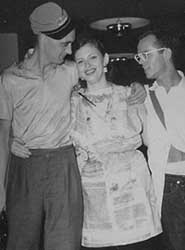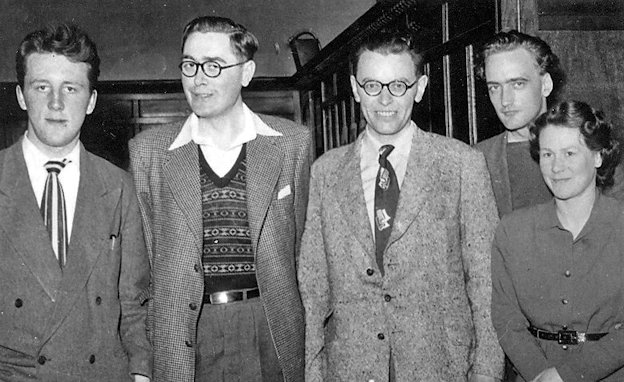Hello all! We hope you had a great Worldcon and that everyone got home safe and well. And to those of you that couldn’t make it, we hope you had a wonderful weekend regardless. Here on the blog, we thought we’d return to Rob Hansen’s celebration of UK and Irish fandom, with another edited extract by him from his ongoing history, Then. At the bottom of the page, you can also read all of the extracts published so far – we’ve got a good few to go! As ever, thanks so much to Rob for allowing us to share this great account of fandom’s progress.
2. Going International
In November 1950, Walt Willis received a letter of comment from a new American fan called Lee Hoffman that praised SLANT and asked for contributions to her fanzine, QUANDRY, “…if you ever feel so inclined”. He did feel so inclined and in March 1951 QUANDRY carried the first instalment of his celebrated column ‘The Harp That Once Or Twice’. This would see forty-four instalments over eighteen years, survive four changes of fanzine, and help make Willis a fannish legend.

Lee Hoffman wearing a dress made of pages from Quandry, with Walt Willis and Max Keasler, at Worldcon in 1952.
Unlike modern-day science fiction conventions, those of this period were often organised only weeks in advance. This was possible mainly because of the low numbers involved at the time and the fact that all that was usually involved was hiring a room for a day or two such as that above the White Horse, the pub where London fans had been meeting every Thursday night for several years. In 1950 no-one got around to it so there wasn’t a convention that year, but in May 1951 the international convention first announced by Ted Carnell almost a year previously, took place in London. This was in all but name the first EUROCON – indeed EUCON had been suggested as a name for it. Timed to coincide with the Festival of Britain, the Festival Convention (later christened FESTIVENTION) was the longest and most successful held in Britain to that point. Preliminary sessions were held in the White Horse on the nights of Thursday 10th and Friday 11th May, followed by Saturday and Sunday at the Royal Hotel in Bloomsbury, and a final, unofficial, session in the Havelock pub on Gray’s Inn Rd on Monday evening.
Bob Shaw, James White, George Charters and Walt and Madeleine Willis at Festivention, 1951.
Though L.Sprague de Camp was originally going to be the convention’s Guest of Honour, it was Forrest J Ackerman who actually filled that role. He was present at the White Horse on the Thursday night, as were his wife Wendayne, Canada’s Lyell Crane, Holland’s Ben Abas, Sweeden’s Sigvard Ostlund, Prof. A.M.Low, and the entirety of Irish Fandom (they had travelled over together on the boat). Attendance that night was around 60, the largest collection of fans ever seen in the White Horse.
During Sunday afternoon the overseas guests were presented. Each gave a report on the state of SF and fandom in their country, Forrest J Ackerman speaking for the US, Georges Gallet for France, Ben Abas for Holland, Sigvard Ostlund for Sweden, Ken Paynter for Australia, and Lyell Crane for Canada. Wendayne Ackerman spoke of the SF and fantasy she’d read during her childhood in Germany. Walt Willis rose to tumultuous applause and gave a report on SF in Ireland:
“I tottered to the microphone and told the Convention about
the recent pocket-book in Gaelic. It didn’t take very long, but I salved my
conscience with the thought that the proceedings were already behind schedule.
No doubt the audience would think I could have made a brilliant oration lasting
some hours if it hadn’t been for my thoughtfulness and unselfishness. I sat down
mid applause, some of which I’m afraid was left over from Carnell’s introduction.
My best friends tell me the speech was very good, but too short (bless their loyal
hearts) and that it came over the PA system with a strong Irish accent. Since I
have no trace of any accent at all I find this very difficult to understand, but
my English friends (all of whom have atrocious English accents) say I always sound
that way to them.”
Later, Willis wrote a report on the convention, called ‘The Harp in England’, that was serialised in QUANDRY. The report was somewhat different in style from those he was to write about later conventions, however:
“The British Convention of 1951 was the first I had ever been at, and the
15-page report on it I wrote for QUANDRY was frighteningly uninhibited. At
least it frightens me now when I re-read it. It didn’t frighten me at the
time partly because I didn’t yet know personally any of the people on the
official programme, and partly because I was under a peculiar
misapprehension about them. I thought of them as pros, remote godlike
figures who moved and had their being on a higher plane altogether. Nothing
a scruffy little fan could say about them could ruffle their Olympian
composure. So I was cheerfully caustic about everything from the food to the
Convention Chairman.”
The first warning Willis got that he had stirred things up was a letter from Vince Clarke to Madeleine Willis, in which he affected to believe she was Walt’s widow. Ted Carnell said he thought the report “stank” and there was other evidence of discord, but the affair soon blew over.
(In-depth coverage of FESTIVENTION, with photos, can be found here)
Though respecting Chuck Harris’s reason for shying away from in-person contact with other fans, Willis nevertheless kept nudging him and the denizens of the Epicentre towards one another and eventually this process bore fruit. On 27th January 1952 Harris visited that hallowed place, and afterwards wrote excitedly to Willis of his first contact with other fans:
“Last night!!! Hell, I just can’t describe everything that happened. It
was the most enjoyable night that I’ve had out in a long time. I think Vince
and Ken are really terrific. Even Gold couldn’t have had a better welcome.
Almost all the time I was there Vince balanced his portable on his knee and
provided a sort of running commentary…Primarily, I went to see the
duplicators but we never got around to it…I’m going again Sunday
week!!”
Looking back on this meeting many years later, Willis saw it not just as an event of great personal significance for Harris but the beginning of something larger:
“And so it started, the nucleus of what later came to be known as Sixth
Fandom, the closest and happiest gestalt ever formed in international
fandom. It lasted until the Great Mackenzie War ((Willis’s own name for the
interconnected series of conflicts that were to afflict British fandom in
the latter half of the decade)), but that was a long time in the future, and
meanwhile fandom became in one sense of the hackneyed phrase a way of
life.”
Sixth Fandom as a group consisted of fans on both sides of the Atlantic and its focal point was Lee Hoffman’s QUANDRY. Over here Sixth fandom was made up of people such as Harris, Clarke, Bulmer, and the members of Irish Fandom, while over there it’s main stalwarts were people such as Hoffman, Wilson ‘Bob’ Tucker, Robert Bloch, Max Keasler, and Shelby Vick. The name itself derived from a system devised by Bob Silverberg for numbering distinct periods of fannish activity in the US, the period they then found themselves in being reckoned the sixth under his system. It was to be the most fruitful and harmonious period in transatlantic fannish relations there had ever been.
-Rob Hansen.
‘Then’ on the Dublin 2019 Blog:
Prologue
Part 1 Belfast Rising
Rob Hansen’s Then (A work always in progress) at Ansible.


